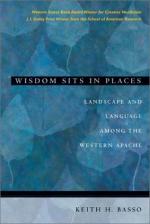
|
| Name: _________________________ | Period: ___________________ |
This test consists of 15 multiple choice questions and 5 short answer questions.
Multiple Choice Questions
1. What was Nick's comment as Basso left Cibecue?
(a) "I cannot work for you next season."
(b) "Your work is invaluable."
(c) "You are a good friend."
(d) "Goodness is all around Cibecue."
2. What does Basso say the story might have been?
(a) Misinterpreted.
(b) An elaborate insurance scam.
(c) A lie.
(d) The truth.
3. What does Basso say ecological studies focus on?
(a) Systemic level.
(b) Pollution.
(c) The plants.
(d) The planet.
4. What did the girl in the story learn from her misfortune?
(a) Not to eat mushrooms.
(b) To learn from her mistakes.
(c) To act rightly.
(d) To trust the elders.
5. What does Basso say is difficult for linguists to explain?
(a) How to translate Apache.
(b) The sequentiality of utterances.
(c) The relation between Navajo and Apache languages.
(d) How Apache language evolved.
6. What does Basso say the Western Apache discourse is a product of?
(a) Inative syllables.
(b) Utterance and inaction.
(c) Interlocking utterances and actions.
(d) Stories.
7. What did the woman think of her ill brother, according to Basso?
(a) He was good.
(b) He was irresponsible.
(c) He was wise.
(d) He was stupid.
8. Who does Basso say were often concerned with the connection between American Indian communities and their ecological settings?
(a) Ecologists.
(b) Apaches.
(c) Scholars.
(d) Anthropologists.
9. What do younger Apache find village life to be?
(a) A good place to live.
(b) Tedious.
(c) A place to worship.
(d) Fun.
10. What problem does Basso say using place-names in the conversation about the brother solve?
(a) The need to be nice to his sister.
(b) The need to speak the truth.
(c) The need to lie.
(d) The need to judge him.
11. What are the major narrative genres divided by?
(a) Time and purpose.
(b) Purpose and people.
(c) People and place.
(d) Time and place.
12. What did the sister of the ill man say after Robert's intervention?
(a) That she loved him.
(b) That nothing more needed to be said.
(c) That he would be missed.
(d) That her dad was as stupid.
13. What type of events does Basso say the Apaches did not have?
(a) Roads.
(b) Good memory.
(c) Rights to their own land.
(d) Placeless.
14. What does speaking with names produce according to Basso?
(a) A mental image.
(b) Large sentences.
(c) Stories.
(d) Better memory.
15. Who told the story, to the girl on her birthday, of the Apache policeman that acted like a white man?
(a) Her mother.
(b) Her father.
(c) Her best friend.
(d) Her grandmother.
Short Answer Questions
1. At what elevation can the Cibecue settlement be found?
2. Whose brother does Basso overhear became ill while visiting Lola?
3. How many forms of speech did the Cibecue have?
4. What does Basso say Lola did when she revealed where the brother fell ill?
5. What does Basso say nearly all the place-names are in the Western Apache Language?
|
This section contains 455 words (approx. 2 pages at 300 words per page) |

|




